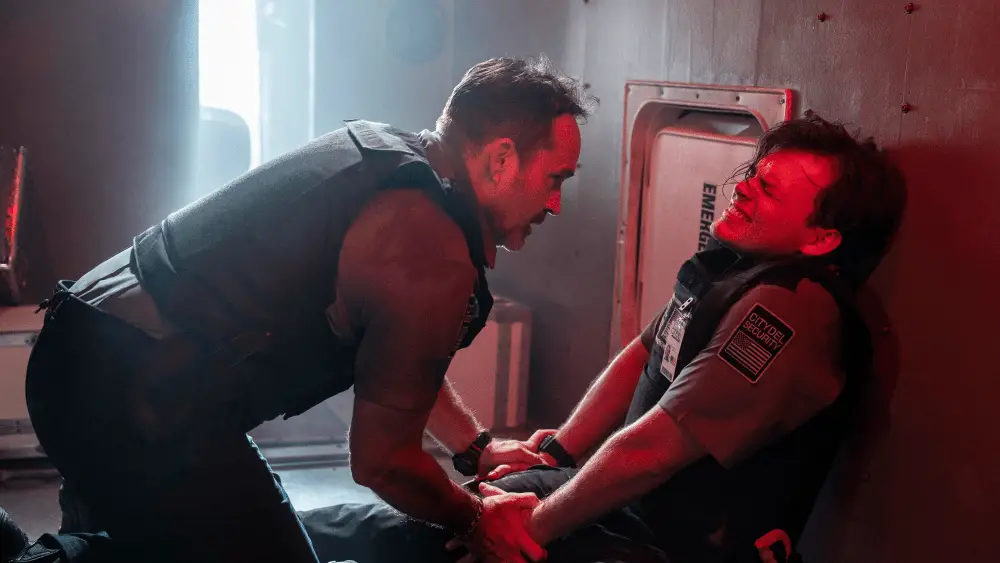Sylvester Stallone rarely plays villains on screen, and judging from his low-key role in Armor, it’s hard to imagine he wanted to. This lack of passion will be felt by most viewers of this uninspiring action programmer. In the film, Josh Wiggins, the son of Jason Patric’s high-income driver and co-worker, is ambushed while transporting bank funds by armed robbers — and, unbeknownst to them, several more. A robber appears. -Precious contraband.
Justin Root’s shots in Mississippi are well-crafted, with the film largely set in a long-running conflict between good guys and bad guys on a rural bridge. But neither the direction nor the performances rise above the limits of Adrian Speccart and Corey Todd Hughes’ screenplay, leaving it mediocre material that isn’t compensated for by any special thrills, style, or character details. Lionsgate will simultaneously release the film in U.S. theaters, digital and on-demand platforms on November 22nd.
When he’s not behind the wheel of an armored vehicle, former police officer James Brody (Patrick) moderates AA meetings. He has ostensibly been sober for six years since hitting rock bottom after losing his wife in an accident that he blamed on himself. But in reality, he is still ingesting a secret, a fact that seems to elude the discovery of his son Casey (Wiggins), who himself has a wife and a baby on the way. You’d think Junior would notice too, considering they work together most days transporting cash between banks. But “Armor” has some core implausibilities.
The best part is that when the carefully planned route is hijacked by Luke (Stallone) and his small team of co-conspirators, somehow no one notices or calls the police. Chased and rammed, the truck finally came to a stop in the middle of a rural bridge, with many structures in sight. So it’s no wonder this tire-squeaking mayhem, much less the gunfire and explosions that followed, didn’t immediately draw the cops. of the law. Also, wouldn’t an armored vehicle carrying such a large amount of cash be monitored by a GPS tracking system? Nothing going on here is interesting enough to make you stop asking persistent questions.
Either way, the father and son will face off against six heavily armed men in black, including Dash Mihok, Joshua David Whites, Blake Shields, and Stallone. They intend to escape with the loot, which turns out to contain the riches of a drug cartel the heroes had no idea they were transporting. Both sides’ tactics get even dirtier when they meet resistance, and after Casey is wounded, the Brodys retreat into the interior of an armored truck. There they endure gassed and sweaty attempts, but also find a way to win over the opposition.
“That rental cop is a tough son of a bitch,” one of the villains eventually says with begrudging admiration… and a fair example of the unfortunately common dialogue here. Around the halfway point, there are flashbacks to the tragedy that turned James’ life upside down, and Erin Ownby appears as his late spouse. It also feels strictly mechanical, as it’s the script’s only notable attempt at character backstory and depth.
I can’t blame the actors for not being able to play the less prominent roles given the script. No one is bad, exactly, but no one is trying too hard either. In Stallone’s case, taking on the challenge doesn’t seem to be on the agenda at all. This appearance is comparable to Bruce Willis’ later appearances, where the big star’s name can’t or won’t hide the fact that he’s just appearing. For the sake of salary. His criminal mastermind was tempered by his recent claim that he was “not a murderer… it’s not in my nature.” However, since he is the boss of this organization, this statement disrupts how his subordinates previously seemed very eager to get rid of the protagonists. For that matter, if the Brody family’s lives are going to be saved, why don’t the bad guys do something to make sure their faces aren’t easily identified?
This kind of logic is lame, but “Armor” might have been more interesting if it had more humor, or if the modest action settings were executed with dignity. Rather, we are fully aware that we are stuck on a bridge with lots of argumentative abuse, and we notice that the road is blocked and wonder why no other cars are coming. Not to mention, I don’t understand why the police didn’t rush to respond to what must have been a rare riot. There is a very noisy crime going on in this countryside. What should ideally play out as a pressure-cooker thriller in real time ends up being far less tense than it needs to be, and while it’s never quite boring, it comes dangerously close.
The best elements of the professional production team are Carré Fino’s widescreen cinematography and bayou location. Neither are used to their full potential, but they’re still fascinating. Also earning points for at least trying to add some regional flair is the soundtrack, packed with cuts from a variety of artists in a bluesy, evocative Southern rock mode.
